Caffeine and Erectile Dysfunction: Can Too Much Hurt Your Performance?
Written by Dr. Pranitha Bangera

Dr. Pranitha Bangera is a gold-medalist healthcare professional with an elite foundation in clinical training and patient care. A researcher at heart, she specializes in creating high-impact, research-driven medical content that empowers readers through accessible patient education. Dr. Bangera focuses on the intersection of digital health and clinical communication, specifically within the fields of sexual health and mental well-being. Her work is dedicated to making complex medical innovations understandable and trustworthy for a global audience.
•
September 10, 2025
Our experts continually monitor the health and wellness space, and we update our articles when new information becomes available.
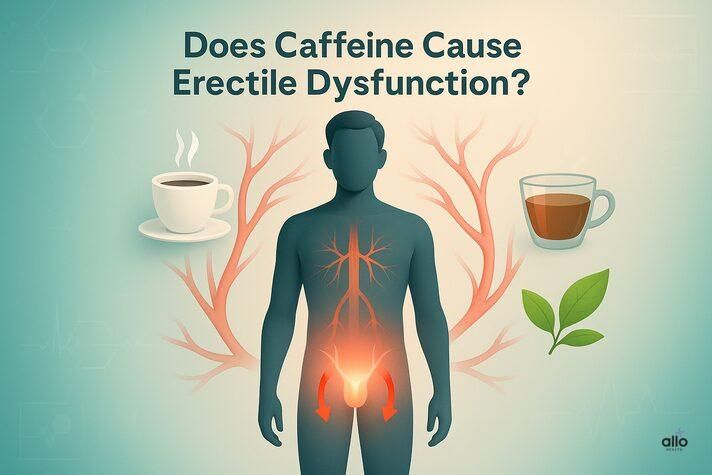
Quick Read
Caffeine does not cause erectile dysfunction. In fact, moderate intake from coffee, tea, or green tea may support blood flow, metabolism, and even testosterone, which are all important for erections. Caffeine isn't the problem, but how much and how often you consume it can be. Excess caffeine (over 400 mg/day) can trigger anxiety, cause poor sleep, high blood pressure, and make ED worse. Energy drinks are riskier because they combine caffeine with sugar and stimulants that stress the heart and blood vessels. In short: enjoy your daily caffeine in moderation, but if ED persists, consult a doctor for proper treatment.
Caffeine doesn’t cause erectile dysfunction. In fact, moderate amounts of caffeine, whether from coffee, tea, or other sources, may actually help by lowering ED risk in some men. The problem arises from excessive caffeine consumption. Too much caffeine intake can trigger anxiety, disturb sleep, or raise blood pressure, all of which can indirectly lead to sexual dysfunction. Caffeine isn't the problem, but how much and how often you consume it can be. Let’s break down whether caffeine causes or helps with ED, how it works, and what to be careful about regarding sexual health while drinking caffeinated beverages.
Does Caffeine Help or Hurt Erectile Function?
Caffeinated beverages are a part of daily life for millions of people. From that morning cup of tea or coffee to the energy drink that gets you through a long day. But when it comes to sexual health, many men wonder if their caffeine habit could be affecting their erections. The truth is, in moderate amounts, caffeine actually supports healthy blood flow, which is crucial for strong erections and healthy sexual function. Research on caffeine and erectile dysfunction is mixed. A 2015 study found that those who consumed the equivalent of 2–3 cups of coffee daily had a slightly lower risk of ED, especially among men with high blood pressure or obesity, though not in men with diabetes. [1] However, a larger 2017 study found no clear link between coffee and ED. [2] It can be concluded that caffeine may help with erections when taken in moderation, as it may support blood flow and overall vascular health.
Allo asks
Do you think your caffeine habits affect your erections?
How Caffeine Works in the Body
Most people know caffeine helps them feel more awake, but fewer realize it also affects blood flow, which is a key factor in erections. Caffeine blocks adenosine, a brain chemical that makes you feel tired. At the same time, it boosts adrenaline, which is called the “fight-or-flight” hormone. This hormone increases alertness, raises your heart rate, and gets more blood pumping through your body. That’s why after a cup of coffee or an energy drink, many people feel sharper, more energetic, and ready to focus. Research shows that caffeine has a vasodilating effect, meaning it can help blood vessels relax and open wider in certain parts of the body. [3] When blood vessels open up, circulation improves. This explains the potential benefits of caffeine in moderation, but it also sets the stage for why too much caffeine can tip the balance and contribute to erection problems, something we’ll explore later.
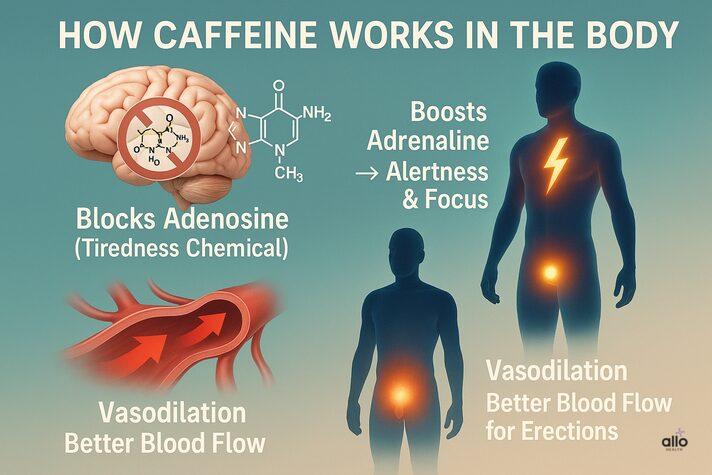
Role Of Caffeine in Erectile Function
Small amounts of caffeine may play a role in the process of gaining an erection. This is by:
1. Relaxation of Muscles in the Penis
- Caffeine acts as a nonselective phosphodiesterase (PDE) inhibitor → think of PDE like a “scissor” that cuts away important signals in the body.
- Phosphodiesterase PDE normally breaks down a messenger chemical called cyclic guanosine monophosphate (cGMP).
- When caffeine blocks PDE, cGMP levels go up. It works like stopping the scissors from cutting paper, so the message can stay longer.
- More cGMP helps the muscles in the penis (cavernous smooth muscle)relax.
- An erection happens when these muscles relax, allowing blood to rush into two sponge-like chambers in the penis (the corpus cavernosum).
- As these chambers fill with blood, the penis becomes firm, making it easier to achieve and maintain an erection.
- In this way, caffeine may play a small supporting role by relaxing smooth muscle in penile blood vessels, widening the arteries, and improving blood flow.
2. Supporting the Nitric Oxide Pathway
- Caffeine is often consumed through beverages like coffee and tea, which contain polyphenols.
- These protect the endothelial cells (cells lining the blood vessels).
- Healthy endothelial cells release nitric oxide (NO), which is a key chemical that relaxes blood vessels and boosts blood flow, both of which are critical for erectile function.
3. Fighting Stress and Inflammation
- Caffeine-containing drinks are rich in antioxidants, which act like “bodyguards” for your cells.
- They fight oxidative stress, which is a kind of damage that happens when harmful molecules (called free radicals) build up in the body.
- Oxidative stress can weaken blood vessels and make them stiff, which is bad for circulation.
- By reducing this stress and calming inflammation, coffee helps keep blood vessels flexible and strong.
4. Hormonal Effects
- Some studies even suggest coffee may help maintain healthy testosterone levels, the key male hormone for sex drive.
- It was found that moderate coffee consumption could boost testosterone production through polyphenol content.
5. Systemic Effects
- Caffeine can slightly increase fat burning, which helps reduce the risk of obesity, one of the biggest contributors to erectile dysfunction. [4]
- Moderate caffeine intake has also been linked to a lower risk of type 2 diabetes [5] and depression[6], two conditions that are strongly associated with ED.
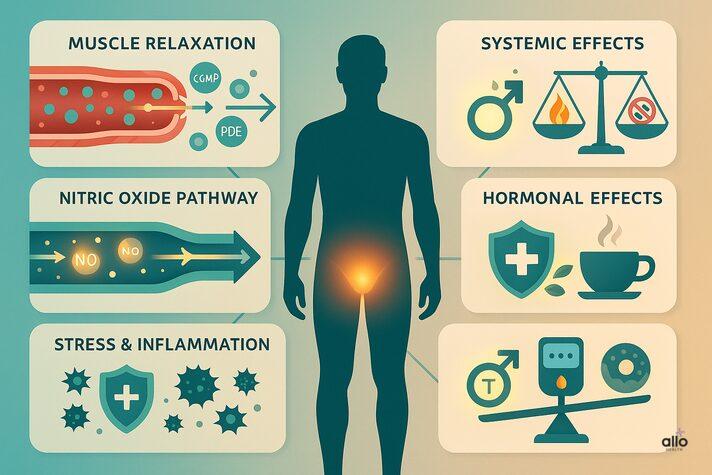
Can Caffeine treat ED?
No. Caffeine can not treat ED. Caffeine doesn’t work as strongly or directly as prescription ED medicines like Viagra (sildenafil) or Cialis (tadalafil). Those drugs are designed to specifically block PDE-5, an enzyme in the penis that controls blood flow. Think of them like a laser pointer. They’re precise and focused on one target, which makes them very effective. Caffeine, on the other hand, is a nonselective PDE inhibitor. Instead of aiming at just one target, it’s more like a flashlight that shines everywhere. It affects different types of PDE enzymes across the whole body, not just the penis. Because of this, the effect on erections is weaker and less reliable. At best, it may help blood vessels relax a little and improve circulation, but it’s nowhere near as powerful as ED medications. If you’re struggling with ongoing erection problems, don’t rely on caffeine as a “treatment.” It’s always best to consult a doctor to identify the root cause and explore proven, safe options for ED management.
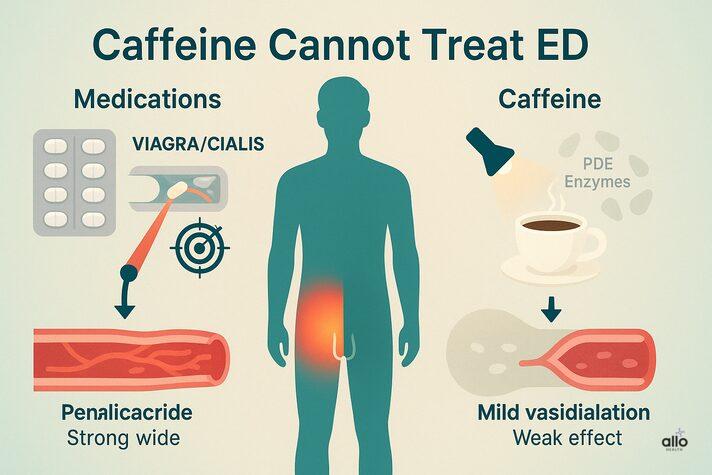
Can Too Much Caffeine Make ED Worse?
Yes, having too much caffeine can make ED worse. Having more than about 400 mg of caffeine a day (roughly 4–5 strong cups of coffee) can tip the balance from helpful to harmful. Here’s how:
- Anxiety spike: Excess caffeine can cause restlessness and jitters. For some men, this causes performance anxiety, which can make ED symptoms worse.
- Sleep disruption: Consuming caffeine late in the day can interfere with sleep. Poor or broken sleep lowers testosterone levels, which gradually weaken erections.
- Higher blood pressure: Long-term high blood pressure (chronic hypertension) damages blood vessels, including the delicate ones that supply the penis.
The problem is even worse with energy and sport drinks, which pack high doses of caffeine along with sugar and other stimulants, putting extra strain on the heart and circulation. Excessive sugar consumption can lead to heart disease. While moderate caffeine intake is generally safe, going overboard can backfire on your sexual health. “According to Allo Health’s internal clinical data, “About 2% of patients with ED experience have linked it to anxiety. These insights are based on our analysis of more than 2.5 lakh patients who have visited our clinics.”
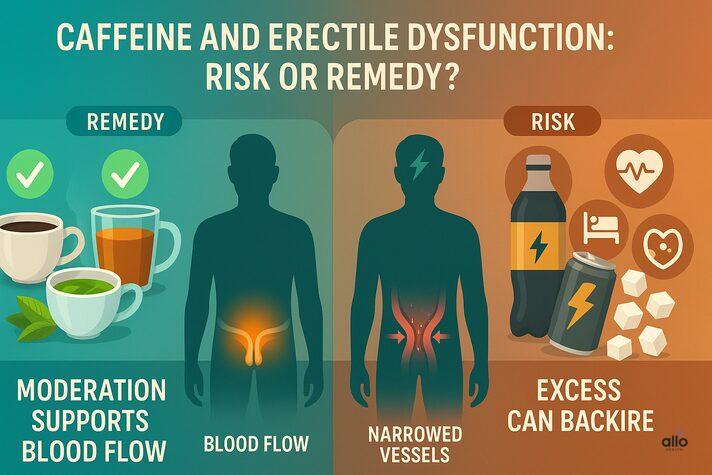
Caffeinated Drinks and Their Impact on ED Risk
Caffeine comes from many different sources. Each of these beverages carries a different level of caffeine, sugar, and additives, which can influence sexual health in different ways. Understanding the ED risk linked to each type of caffeinated drink can help you make smarter choices for both your overall health and your erections.
Type
Caffeine Content
ED Risk
Coffee
60–120 mg per cup
- Low to Moderate risk.
- Excess (>4 cups/day) could affect sleep/ cause anxiety.
Tea(Chai)
30–50 mg per cup
- Low to Moderate risk
Pre-workout
100–350 mg per scoop
- Moderate to high risk
Soft Drinks / Colas
30–45 mg per 330 ml can
- Low direct risk.
- High sugar may increase obesity/diabetes (known ED risk factors)
Sugar-Free Soft Drinks (Diet Coke)
30–45 mg per 330 ml can
- Low to moderate risk. (contains caffeine)
Chocolate / Cocoa
10–40 mg per serving
- Negligible risk from caffeine
- Excess sugar can add long-term metabolic risks.
Energy Drinks
70–150 mg per 250 ml can
- Moderate risk
- Sugar may increase obesity/diabetes (known ED risk factors)
Green Tea
15–29 mg per serving
- Low risk
- Beneficial due to antioxidants.
Many men are also sharing their personal experiences online about caffeine and sexual performance. Some say their daily coffee makes them feel more energetic and confident, while others mention that too much caffeine leaves them anxious, restless, or unable to sleep, which makes erections harder to maintain. [7]
Healthy Caffeine Habits for Better Sexual Health
- Know your limit: Keep total caffeine intake under 400 mg per day [8] (about 3–4 regular cups of coffee), unless your doctor recommends otherwise. Everyone’s tolerance is different, so it helps to do a quick dietary recall. Think about all the sources of caffeine you’ve had in a day to make sure you’re not unknowingly going over the safe range.
- Protect your sleep: Skip caffeine in the late afternoon or evening so it doesn’t interfere with rest and recovery.
- Balance with water: Caffeine can be mildly dehydrating, so make sure you drink enough fluids throughout the day.
- Consider decaf options: If you enjoy the taste and ritual of coffee but want to reduce your caffeine load, decaffeinated coffee is a smart alternative. It delivers the same flavor and many of the antioxidant benefits of regular coffee, without the sleep disruption or strain on the cardiovascular system that high caffeine intake can cause.
- Be cautious with energy drinks: They often pack extra caffeine, sugar, and stimulants. It's best when kept to a minimum or avoided altogether.
“Doctors at Allohealth often advise patients to be cautious with energy drinks. It’s not just the caffeine, but the added sugar and stimulants can put extra stress on the heart, which over time may contribute to erection problems.”
Bottom Line
Caffeine doesn’t directly cause erectile dysfunction. In fact, moderate intake may support erections by improving blood flow, testosterone, and metabolism. The problem arises with excess caffeine (over 400 mg/day), which can trigger anxiety, poor sleep, and high blood pressure, all of which harm sexual function. Energy drinks are riskier, as they mix caffeine with sugar and stimulants that stress the heart and vessels. Moderate caffeine is safe, but it’s not a cure for ED. If erection problems persist, consult a doctor for proper diagnosis and treatment.
Disclaimer
The following blog article discusses food and diet-related information for general educational purposes. However, it is important to note that the information provided is not intended as personalized dietary advice and should not be considered a substitute for professional guidance from a registered dietitian or qualified healthcare professional. Before making any significant changes to your diet or nutrition plan, it is recommended to consult with a registered dietitian or healthcare professional. Dietary changes can have a significant impact on your overall health and well-being. It is important to approach any changes to your diet in a balanced and sustainable manner, ensuring that you meet your nutritional needs and avoid any potential nutrient deficiencies. Rapid or extreme changes in dietary patterns can be detrimental to your health and may require professional guidance. It is crucial to note that any specific dietary recommendations or guidelines mentioned in this article may not be appropriate for individuals with specific medical conditions, allergies, or intolerances. A registered dietitian or healthcare professional can provide individualized advice, including modifications or alternative food choices to accommodate your unique circumstances. The information provided in this article may not encompass all possible dietary considerations or account for the latest research and nutritional guidelines.
Most Asked Questions
Can too much caffeine cause erectile dysfunction?
Drinking more than 400 mg of caffeine a day (about 4–5 cups of coffee) can increase anxiety, disrupt sleep, and raise blood pressure, all of which may worsen ED.
Does caffeine help men stay hard?
Moderate caffeine may improve blood flow and help support erections, but it’s not a guaranteed solution.
Does caffeine work like Viagra?
Not really. Caffeine may support circulation and provide antioxidants, but it doesn’t have the targeted, powerful effect of medications like Viagra or Cialis.
Can coffee increase testosterone?
Some studies suggest moderate coffee or caffeine intake may help maintain testosterone levels, but the evidence is mixed and not conclusive.
Is Red Bull bad for erectile dysfunction?
Energy drinks like Red Bull often combine high caffeine with sugar and stimulants. Overuse can strain the heart, raise blood pressure, and worsen ED risk.
Sources
- 1.
Coffee Intake and Incidence of Erectile Dysfunction
- 2.
Role of Caffeine Intake on Erectile Dysfunction in US Men: Results from NHANES 2001-2004
- 3.
Effect of caffeine contained in a cup of coffee on microvascular function in healthy subjects
- 4.
The effects of caffeine intake on weight loss: a systematic review and dos-response meta-analysis of randomized controlled trials
- 5.
Coffee and Lower Risk of Type 2 Diabetes: Arguments for a Causal Relationship
- 6.
Coffee, tea, caffeine and risk of depression: A systematic review and dose-response meta-analysis of observational studies
- 7.
Erectile dysfunction from excessive coffee (or caffeine) consumption over time?
- 8.
Spilling the Beans: How Much Caffeine is Too Much?


